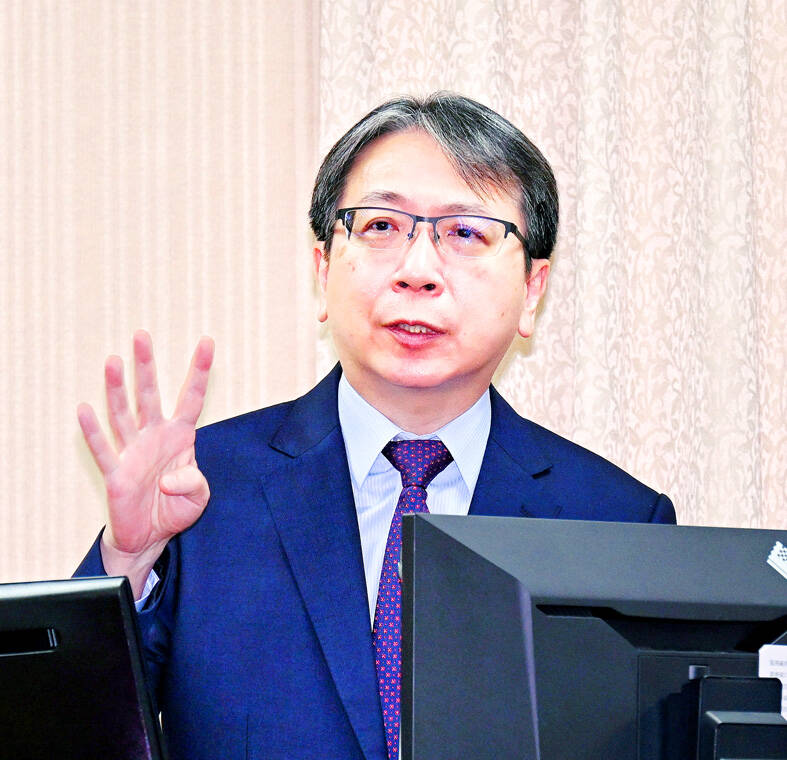The government would closely monitor Chinese spouses who have been coordinating with the Chinese Communist Party (CCP) to engage in “united front” work against Taiwan, or have been receiving funding from the CCP to establish pro-unification organizations, National Security Bureau Director-General Tsai Ming-yen (蔡明彥) said yesterday.
“The bureau’s position is very clear. We respect Chinese spouses as long as they engage in legal activities in Taiwan, but we will closely monitor those who have been coordinating with the Chinese government on united front work against Taiwan, hosting cross-strait exchanges for political purposes and receiving sponsorships from Beijing to establish pro-unification groups,” Tsai told reporters before attending a meeting of the legislature’s Foreign Affairs and National Defense Committee.
“If there is substantial evidence showing that they are agents for the Chinese government, we would turn the case over to the justice system to be investigated,” he said.

Photo: Fang Pin-chao, Taipei Times
Activities of Chinese spouses in Taiwan came under scrutiny after the Taiwan People’s Party was reported to be considering listing Taiwan New Residents Development Association chairwoman Xu Chunying (徐春鶯) as one of the party’s legislators-at-large.
A video circulating online shows her and a group of Chinese who have married Taiwanese wearing scarves resembling those worn by China’s Red Guards in the 1960s and singing the praise of former Chinese leader Mao Zedong (毛澤東).
Xu defended herself on Sunday, saying she was never a member of the Chinese Communist Party (CCP) or the Communist Youth League of China.
Tsai yesterday said that some heads of polling companies and academics are visiting China at the CCP’s invitation, and some polling companies’ funding comes from Chinese capital.
The bureau is investigating these money flows, he added.
If visits to China by academics and political commentators are “normal exchanges,” the bureau would not intervene, Tsai said.
However, if there are “abnormal situations, the bureau is keeping an eye,” he said, without elaborating.
China is using various methods to interfere in January’s presidential and legislative elections, Tsai said.
For example, misinformation in the form of short video clips generated by artificial intelligence is circulating on social media, he said.
Groups and political commentators are also being invited to attend forums in China, which the CCP is filming and circulating online, Tsai said.
Asked by Democratic Progressive Party Legislator Liu Shyh-fang (劉世芳) whether the bureau can release the names of these political commentators, Tsai said that it has the online situation under control.
Once presidential hopefuls officially register their candidacies and launch their election campaigns, people suspected of irregularities would be investigated for contravening the Anti-infiltration Act (反滲透法), he added.

Alain Robert, known as the "French Spider-Man," praised Alex Honnold as exceptionally well-prepared after the US climber completed a free solo ascent of Taipei 101 yesterday. Robert said Honnold's ascent of the 508m-tall skyscraper in just more than one-and-a-half hours without using safety ropes or equipment was a remarkable achievement. "This is my life," he said in an interview conducted in French, adding that he liked the feeling of being "on the edge of danger." The 63-year-old Frenchman climbed Taipei 101 using ropes in December 2004, taking about four hours to reach the top. On a one-to-10 scale of difficulty, Robert said Taipei 101

Nipah virus infection is to be officially listed as a category 5 notifiable infectious disease in Taiwan in March, while clinical treatment guidelines are being formulated, the Centers for Disease Control (CDC) said yesterday. With Nipah infections being reported in other countries and considering its relatively high fatality rate, the centers on Jan. 16 announced that it would be listed as a notifiable infectious disease to bolster the nation’s systematic early warning system and increase public awareness, the CDC said. Bangladesh reported four fatal cases last year in separate districts, with three linked to raw date palm sap consumption, CDC Epidemic Intelligence

US climber Alex Honnold left Taiwan this morning a day after completing a free-solo ascent of Taipei 101, a feat that drew cheers from onlookers and gained widespread international attention. Honnold yesterday scaled the 101-story skyscraper without a rope or safety harness. The climb — the highest urban free-solo ascent ever attempted — took just more than 90 minutes and was streamed live on Netflix. It was covered by major international news outlets including CNN, the New York Times, the Guardian and the Wall Street Journal. As Honnold prepared to leave Taiwan today, he attracted a crowd when he and his wife, Sanni,

Taiwanese and US defense groups are collaborating to introduce deployable, semi-autonomous manufacturing systems for drones and components in a boost to the nation’s supply chain resilience. Taiwan’s G-Tech Optroelectronics Corp subsidiary GTOC and the US’ Aerkomm Inc on Friday announced an agreement with fellow US-based Firestorm Lab to adopt the latter’s xCell, a technology featuring 3D printers fitted in 6.1m container units. The systems enable aerial platforms and parts to be produced in high volumes from dispersed nodes capable of rapid redeployment, to minimize the risk of enemy strikes and to meet field requirements, they said. Firestorm chief technology officer Ian Muceus said